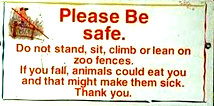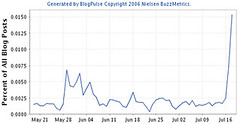There is something to be learned from Whole Foods Market, Inc. (WFMI) beyond its back to school nutritional program. Sometimes silence can be a golden as a July Pippin'.
That's what you'll learn if you visit John Mackey’s blog today. All you will find is silence. The CEO of Whole Foods left his last message, directed to shareholders, on July 17…
“A Special Committee of our Board of Directors' is conducting an independent internal investigation into online financial message board postings related to Whole Foods Market and Wild Oats Markets, Inc. (OATS). In light of this, it is in the best interest of the company to temporarily hold off on posting on my Company blog. The ability to post comments to this blog will be disabled during this time as well. I look forward to resuming our conversations and plan on being in touch with you again soon.”
He will. There is very little doubt. Despite anonymously posting disparaging remarks that may have impacted the stock price of Wild Oats, the company that Whole Foods is now fighting the Federal Trade Commission to acquire; the SEC investigation; the independent internal investigation; and the calls for his resignation by dozens of organizations, including CtW Investment Group, whose members own about 900,000 Whole Foods shares, Mackey will likely retain his position.
Less certain is whether Whole Foods will acquire Wild Oats, but that is another conversation thread all together. Lawyers for Whole Foods and the federal government are set to offer closing arguments today.
More in line with observations in communication is noting: this case study will likely become the bane of public relations professionals because it chips away at what some call the tenets of crisis communication. Maybe that’s a good thing.
For example, against what most PR pros would advise, Whole Foods went silent on the issue after apologizing to stakeholders (never mind Wild Oats shareholders who may have lost money on the advice of the masked Wild Oats stock vandal “rahodeb”). Then, yesterday, earned an extremely rare and generous pass from the media, allowing him to break his company's self-censorship and tout that they beat Wall Street estimates.
"Currently we do not expect the same degree of year-over-year increase in our total pre-opening expenses," Mackey said, as reported by CNN Money. "We are very excited to see the acceleration in our new store openings materialize, as we expect these new stores to drive strong sales and comparable-store sales growth in the not-so-distant future.”
As found in The Wall Street Journal: “I could understand if Mr. Mackey was accused of spreading false rumors about his company to manipulate the stock price, but I have not heard such allegations.” Or perhaps even more telling from The Motley Fool …
“Look, I'm not saying that John Mackey should have gone onto the Yahoo! message board for Whole Foods and posted anonymous messages extolling his company while trashing Wild Oats. It was dumb, an activity with almost no hope for upside. But I understand it. I understand why John Mackey would see the nonsense that some random keyboard heroes wrote about him and his company and find the impulse to shoot back irresistible.”
Chip. Chip. Chip. It is any wonder why some public relations professionals have a hard time finding a position at the proverbial “table?” You cannot get there until you understand business let alone the new state of media, which suggests that today’s editors and analysts would rather be right than write about what is right.
"From a Whole Foods perspective we will be glad one way or another to have this situation resolved because it's taken a lot of management time and we spent a lot of money on lawyers," CNN Money reports Mackey said on a call. "It's been incredibly burdensome on us."
Like a fly buzzing in their ears, I imagine. Whether Whole Foods is allowed to acquire Wild Oats or not, Mackey and Whole Foods will not only survive but will also continue to see their stock fare well. Pending some revelation from the internal or SEC investigation of Whole Foods, it also seems unlikely to me that Mackey will be leaving anytime soon, chipping away at the notion that companies have to make a sacrifice in order to emerge from a crisis.
So what makes Mackey so special? As part of what I call my Fragile Brand Theory, Mackey has always been successful in presenting himself as somewhat eccentric thereby putting himself in the position to garner understanding in the wake of what Mackey himself even called his own “lack of judgment.”
That doesn’t make what he did right by any stretch of the imagination. While some people wonder about the Mackey case study “if we are not falling victim to a distorted sense of hubris in the United States: We are offended to the point of threatening legal action over surficial issues that are probably neither unethical or illegal,” I hopefully offer a clearer perspective.
What Mackey did, posing as an anonymous poster with an alleged agenda to damage his competition for future gain, was unethical.
Whether or not it is illegal is up to the SEC to decide. Whether or not the remedy is his resignation is up to the shareholders to decide. Whether or not shareholders are outraged will likely depend on the price of the shares. And whether or not the media decides to give him a pass or not will largely be dictated by the previous three outcomes.
I’m not saying this is right, but it is what it is. And what also “is” is that public relations professionals need to move away from formulaic approaches to crisis communication and consider the thought processes behind those bullet points. (We’ll compare this crisis to traditional crisis communication check lists next week.)
If they do not, executives will be hard pressed to take the profession seriously when good CEOs like David Neeleman at JetBlue play it by the “book” and are pushed aside while CEOs like Mackey, who clearly breached ethics, can break away and be heralded as a wacky egomaniac who, well, make shareholders lots of money.
Then again, I suppose all those who claimed the remedy is resignation still have a shot to be “right” as this case study seems far from over. But when it is over, I can promise you this: I'll probably have to add a warning label. Don't Try This At Home.

That's what you'll learn if you visit John Mackey’s blog today. All you will find is silence. The CEO of Whole Foods left his last message, directed to shareholders, on July 17…
“A Special Committee of our Board of Directors' is conducting an independent internal investigation into online financial message board postings related to Whole Foods Market and Wild Oats Markets, Inc. (OATS). In light of this, it is in the best interest of the company to temporarily hold off on posting on my Company blog. The ability to post comments to this blog will be disabled during this time as well. I look forward to resuming our conversations and plan on being in touch with you again soon.”
He will. There is very little doubt. Despite anonymously posting disparaging remarks that may have impacted the stock price of Wild Oats, the company that Whole Foods is now fighting the Federal Trade Commission to acquire; the SEC investigation; the independent internal investigation; and the calls for his resignation by dozens of organizations, including CtW Investment Group, whose members own about 900,000 Whole Foods shares, Mackey will likely retain his position.
Less certain is whether Whole Foods will acquire Wild Oats, but that is another conversation thread all together. Lawyers for Whole Foods and the federal government are set to offer closing arguments today.
More in line with observations in communication is noting: this case study will likely become the bane of public relations professionals because it chips away at what some call the tenets of crisis communication. Maybe that’s a good thing.
For example, against what most PR pros would advise, Whole Foods went silent on the issue after apologizing to stakeholders (never mind Wild Oats shareholders who may have lost money on the advice of the masked Wild Oats stock vandal “rahodeb”). Then, yesterday, earned an extremely rare and generous pass from the media, allowing him to break his company's self-censorship and tout that they beat Wall Street estimates.
"Currently we do not expect the same degree of year-over-year increase in our total pre-opening expenses," Mackey said, as reported by CNN Money. "We are very excited to see the acceleration in our new store openings materialize, as we expect these new stores to drive strong sales and comparable-store sales growth in the not-so-distant future.”
As found in The Wall Street Journal: “I could understand if Mr. Mackey was accused of spreading false rumors about his company to manipulate the stock price, but I have not heard such allegations.” Or perhaps even more telling from The Motley Fool …
“Look, I'm not saying that John Mackey should have gone onto the Yahoo! message board for Whole Foods and posted anonymous messages extolling his company while trashing Wild Oats. It was dumb, an activity with almost no hope for upside. But I understand it. I understand why John Mackey would see the nonsense that some random keyboard heroes wrote about him and his company and find the impulse to shoot back irresistible.”
Chip. Chip. Chip. It is any wonder why some public relations professionals have a hard time finding a position at the proverbial “table?” You cannot get there until you understand business let alone the new state of media, which suggests that today’s editors and analysts would rather be right than write about what is right.
"From a Whole Foods perspective we will be glad one way or another to have this situation resolved because it's taken a lot of management time and we spent a lot of money on lawyers," CNN Money reports Mackey said on a call. "It's been incredibly burdensome on us."
Like a fly buzzing in their ears, I imagine. Whether Whole Foods is allowed to acquire Wild Oats or not, Mackey and Whole Foods will not only survive but will also continue to see their stock fare well. Pending some revelation from the internal or SEC investigation of Whole Foods, it also seems unlikely to me that Mackey will be leaving anytime soon, chipping away at the notion that companies have to make a sacrifice in order to emerge from a crisis.
So what makes Mackey so special? As part of what I call my Fragile Brand Theory, Mackey has always been successful in presenting himself as somewhat eccentric thereby putting himself in the position to garner understanding in the wake of what Mackey himself even called his own “lack of judgment.”
That doesn’t make what he did right by any stretch of the imagination. While some people wonder about the Mackey case study “if we are not falling victim to a distorted sense of hubris in the United States: We are offended to the point of threatening legal action over surficial issues that are probably neither unethical or illegal,” I hopefully offer a clearer perspective.
What Mackey did, posing as an anonymous poster with an alleged agenda to damage his competition for future gain, was unethical.
Whether or not it is illegal is up to the SEC to decide. Whether or not the remedy is his resignation is up to the shareholders to decide. Whether or not shareholders are outraged will likely depend on the price of the shares. And whether or not the media decides to give him a pass or not will largely be dictated by the previous three outcomes.
I’m not saying this is right, but it is what it is. And what also “is” is that public relations professionals need to move away from formulaic approaches to crisis communication and consider the thought processes behind those bullet points. (We’ll compare this crisis to traditional crisis communication check lists next week.)
If they do not, executives will be hard pressed to take the profession seriously when good CEOs like David Neeleman at JetBlue play it by the “book” and are pushed aside while CEOs like Mackey, who clearly breached ethics, can break away and be heralded as a wacky egomaniac who, well, make shareholders lots of money.
Then again, I suppose all those who claimed the remedy is resignation still have a shot to be “right” as this case study seems far from over. But when it is over, I can promise you this: I'll probably have to add a warning label. Don't Try This At Home.



























